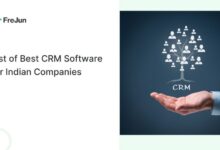CRM Based Products: 7 Ultimate Power Tools for Growth
In today’s fast-paced digital world, businesses are turning to CRM based products to supercharge customer relationships, streamline operations, and drive explosive growth. These tools aren’t just for sales teams—they’re transforming how companies engage, retain, and delight customers at every touchpoint.
What Are CRM Based Products and Why They Matter

Customer Relationship Management (CRM) based products are software solutions designed to help businesses manage interactions with current and potential customers. They centralize customer data, automate workflows, and provide insights that fuel smarter decision-making across sales, marketing, and customer service.
Defining CRM Based Products
CRM based products encompass a wide range of software platforms that collect, organize, and analyze customer data. These tools act as a single source of truth for all customer-related activities, from initial lead capture to post-sale support. Whether cloud-based or on-premise, these systems are built to enhance customer engagement and improve business efficiency.
- They track customer interactions across email, phone, social media, and websites.
- They integrate with other business tools like email marketing, ERP, and e-commerce platforms.
- They offer dashboards and reporting features for performance tracking.
“A CRM isn’t just a database—it’s a strategic asset that turns customer data into actionable insights.” — Forbes
Evolution of CRM Technology
The concept of CRM has evolved significantly since its inception in the 1980s. What began as simple contact management systems has transformed into intelligent, AI-powered platforms capable of predictive analytics and automated customer journeys.
- 1980s: Contact management via desktop databases.
- 1990s: Introduction of sales force automation and call centers.
- 2000s: Cloud-based CRMs like Salesforce revolutionized accessibility.
- 2010s–Present: Integration of AI, machine learning, and omnichannel engagement.
This evolution has made CRM based products more scalable, user-friendly, and essential for businesses of all sizes. Modern platforms now offer mobile access, real-time collaboration, and deep integrations with third-party apps, making them indispensable in a digital-first economy.
Core Benefits of Using CRM Based Products
Implementing CRM based products delivers measurable advantages across departments. From boosting sales productivity to enhancing customer satisfaction, the benefits are both immediate and long-term.
- Improved Customer Retention: By tracking customer behavior and preferences, businesses can deliver personalized experiences that foster loyalty.
- Increased Sales Efficiency: Automation of lead scoring, follow-ups, and pipeline management reduces manual work and accelerates deal closures.
- Better Data Accuracy: Centralized data eliminates silos and ensures all teams work with up-to-date information.
According to a Nucleus Research study, businesses gain an average return of $8.71 for every dollar spent on CRM, highlighting the financial impact of these tools.
Top 7 CRM Based Products Dominating the Market in 2024
The CRM landscape is crowded with platforms offering varying features, pricing models, and industry specializations. To help you navigate this space, we’ve compiled a list of the seven most powerful CRM based products shaping business success today.
1. Salesforce Sales Cloud
Salesforce remains the gold standard in CRM based products, with its Sales Cloud offering unmatched scalability and customization. It’s ideal for enterprises and mid-sized businesses looking for a robust, feature-rich platform.
- AI-powered insights via Einstein Analytics.
- Advanced pipeline and forecasting tools.
- Extensive AppExchange for third-party integrations.
Salesforce’s ecosystem allows businesses to build custom workflows, automate marketing campaigns, and connect with over 3,000 apps. Its global presence and continuous innovation make it a top choice for organizations aiming for digital transformation. Learn more at salesforce.com.
2. HubSpot CRM
HubSpot CRM stands out for its user-friendly interface and seamless integration between marketing, sales, and service hubs. It’s particularly popular among small to mid-sized businesses and startups.
- Free CRM with powerful automation features.
- Drag-and-drop workflow builder.
- Integrated email tracking and meeting scheduling.
One of HubSpot’s strengths is its inbound methodology, which aligns CRM functionality with content marketing and lead nurturing. Its free tier offers core CRM features, making it accessible for businesses on a budget. Explore it at hubspot.com.
3. Zoho CRM
Zoho CRM is a cost-effective, highly customizable solution that caters to businesses across industries. It combines affordability with enterprise-grade features, making it a favorite among growing companies.
- Zia AI assistant for predictive sales forecasting.
- Multi-channel communication (email, phone, social, chat).
- Strong automation and workflow rules.
Zoho’s ecosystem includes over 50 integrated business apps, allowing users to manage everything from finance to project management within one suite. Its pricing model is transparent and scalable, starting from as low as $14/user/month. Visit zoho.com/crm for details.
4. Microsoft Dynamics 365
Microsoft Dynamics 365 integrates seamlessly with Office 365 and other Microsoft products, making it a natural fit for organizations already embedded in the Microsoft ecosystem.
- Deep integration with Outlook, Teams, and Excel.
- AI-driven insights and relationship analytics.
- Flexible deployment options (cloud, on-premise, hybrid).
Dynamics 365 is particularly strong in industries like manufacturing, retail, and professional services. Its modular design allows businesses to start with CRM and add ERP capabilities as needed. More info at dynamics.microsoft.com.
5. Pipedrive
Pipedrive is built for sales teams that prioritize pipeline visibility and deal management. Its visual sales pipeline makes it easy to track progress and identify bottlenecks.
- Intuitive drag-and-drop interface.
- Activity-based selling approach.
- Strong mobile app for on-the-go access.
Pipedrive excels in simplicity and focus, avoiding feature bloat while delivering essential CRM functionalities. It’s ideal for small sales teams and solo entrepreneurs. Check it out at pipedrive.com.
6. Freshsales (by Freshworks)
Freshsales offers an AI-powered CRM with built-in phone, email, and chat capabilities. It’s designed for speed and ease of use, making onboarding quick and effective.
- Integrated phone and email within the CRM.
- Lead scoring and behavior tracking.
- Visual deal pipeline and timeline view.
Freshsales stands out for its all-in-one communication tools, reducing the need for third-party integrations. Its AI assistant, Freddy, helps automate follow-ups and prioritize leads. Learn more at freshworks.com/crm.
7. Oracle CX Sales
Oracle CX Sales is a high-end CRM solution tailored for large enterprises with complex sales cycles and global operations.
- Advanced AI and machine learning for forecasting.
- Real-time sales performance dashboards.
- Strong compliance and security features.
Oracle’s platform integrates with its broader Customer Experience (CX) suite, offering end-to-end management of customer journeys. It’s particularly suited for industries like finance, healthcare, and telecommunications. Explore at oracle.com/cx/sales.
Key Features to Look for in CRM Based Products
Not all CRM based products are created equal. Choosing the right one requires evaluating key features that align with your business goals, team size, and industry needs.
Automation and Workflow Management
One of the most valuable aspects of CRM based products is their ability to automate repetitive tasks. This includes email follow-ups, task assignments, data entry, and lead nurturing sequences.
- Reduces human error and increases consistency.
- Enables teams to focus on high-value activities.
- Improves response times and customer satisfaction.
Look for platforms that offer customizable workflows and trigger-based actions. For example, when a lead downloads a whitepaper, the CRM can automatically assign a sales rep, send a follow-up email, and schedule a call.
Integration Capabilities
A CRM should not exist in isolation. The best CRM based products offer seamless integration with tools like email marketing platforms (Mailchimp, Constant Contact), e-commerce systems (Shopify, WooCommerce), and productivity suites (Google Workspace, Microsoft 365).
- Ensures data flows smoothly across systems.
- Eliminates manual data entry and duplication.
- Enables unified customer profiles across touchpoints.
Platforms like Salesforce and HubSpot offer extensive API access and pre-built connectors, making integration easier and faster.
Analytics and Reporting
Data is only valuable if it’s actionable. CRM based products should provide robust reporting tools that allow teams to track KPIs, monitor sales performance, and identify trends.
- Customizable dashboards for real-time insights.
- Forecasting tools for revenue prediction.
- Customer segmentation and campaign performance analysis.
Advanced analytics, powered by AI, can predict customer churn, recommend next-best actions, and identify upsell opportunities. These insights empower strategic decision-making at both operational and executive levels.
How CRM Based Products Transform Sales Teams
Sales teams are the primary users of CRM based products, and the impact on their performance is profound. From lead management to deal closure, CRM tools streamline every stage of the sales cycle.
Lead Management and Qualification
CRM based products enable sales teams to capture leads from multiple sources—website forms, social media, events, and ads—and organize them in a centralized database.
- Automated lead scoring based on behavior and demographics.
- Routing leads to the right sales representative.
- Tracking lead source and campaign effectiveness.
This structured approach ensures no lead falls through the cracks and allows teams to prioritize high-potential prospects.
Sales Pipeline Visibility
A clear view of the sales pipeline is critical for forecasting and resource allocation. CRM based products provide visual representations of deals at various stages, from prospecting to closing.
- Identifies bottlenecks in the sales process.
- Enables managers to coach reps based on real-time data.
- Improves accuracy of revenue forecasts.
Tools like Pipedrive and Salesforce offer drag-and-drop pipeline management, making it easy to update deal stages and track progress.
Enhanced Communication and Collaboration
Modern CRM based products include collaboration features such as shared calendars, internal notes, and team activity feeds.
- Facilitates handoffs between sales and support teams.
- Keeps all stakeholders informed about customer interactions.
- Reduces miscommunication and duplicate efforts.
Integration with communication tools like Slack and Microsoft Teams further enhances team coordination.
The Role of CRM Based Products in Marketing Automation
Marketing teams leverage CRM based products to create targeted campaigns, nurture leads, and measure ROI with precision.
Lead Nurturing and Drip Campaigns
CRM systems allow marketers to design automated email sequences that deliver relevant content based on user behavior.
- Sends personalized emails when a lead visits a pricing page.
- Triggers follow-ups after webinar attendance.
- Segments audiences based on engagement levels.
This level of automation ensures consistent communication without manual effort, increasing conversion rates over time.
Customer Segmentation and Personalization
CRM based products collect rich customer data, enabling marketers to segment audiences by demographics, behavior, and purchase history.
- Delivers personalized product recommendations.
- Customizes messaging for different buyer personas.
- Improves campaign relevance and open rates.
Personalization powered by CRM data can increase email click-through rates by up to 14%, according to Campaign Monitor.
Measuring Marketing ROI
With CRM integration, marketers can track which campaigns generate the most leads and revenue.
- Attributes conversions to specific channels (email, social, paid ads).
- Calculates cost per lead and customer acquisition cost (CAC).
- Identifies high-performing content and underperforming campaigns.
This data-driven approach allows for continuous optimization of marketing strategies.
CRM Based Products and Customer Service Excellence
Customer service is no longer a standalone function—it’s a core component of the customer experience, and CRM based products play a pivotal role in elevating service quality.
360-Degree Customer View
CRM systems provide service agents with a complete history of customer interactions, including past purchases, support tickets, and communication logs.
- Enables faster resolution of issues.
- Reduces the need for customers to repeat information.
- Builds trust through personalized service.
This holistic view ensures that every support interaction is informed and efficient.
Case Management and Ticketing
CRM based products often include built-in ticketing systems that allow teams to log, assign, and track customer inquiries.
- Automates ticket routing based on issue type or priority.
- Sets SLAs (Service Level Agreements) for response times.
- Provides escalation paths for complex issues.
Platforms like Zendesk and Freshdesk integrate tightly with CRM systems to streamline support operations.
Self-Service and Knowledge Bases
Many CRM based products support customer self-service portals where users can find answers, submit tickets, and track resolutions.
- Reduces support ticket volume.
- Empowers customers to solve problems independently.
- Improves overall satisfaction and reduces wait times.
HubSpot and Salesforce offer robust knowledge base features that can be customized and scaled as needed.
Choosing the Right CRM Based Product for Your Business
Selecting the right CRM based product requires careful evaluation of your business needs, budget, and long-term goals. A one-size-fits-all approach rarely works.
Assess Your Business Needs
Start by identifying your primary objectives: Are you looking to improve sales efficiency, enhance marketing automation, or boost customer service?
- Small businesses may prioritize ease of use and affordability.
- Enterprises may need scalability, security, and advanced analytics.
- Industry-specific needs (e.g., real estate, healthcare) may require specialized features.
Conduct stakeholder interviews and map out key workflows to determine what functionality is essential.
Consider Scalability and Flexibility
Your CRM should grow with your business. Look for platforms that offer modular pricing, API access, and customization options.
- Can the CRM handle increased data volume and user count?
- Does it support multi-language and multi-currency for global expansion?
- Is it easy to add new modules or integrations?
Cloud-based solutions like Zoho and HubSpot offer excellent scalability with minimal infrastructure investment.
Evaluate User Adoption and Training
Even the best CRM based products fail if teams don’t use them. Prioritize platforms with intuitive interfaces and strong onboarding support.
- Look for vendors that offer training resources and customer support.
- Consider user feedback and review sites like G2 and Capterra.
- Run a pilot program with a small team before full rollout.
User adoption is often the biggest hurdle, so choose a CRM that minimizes resistance and maximizes engagement.
Future Trends in CRM Based Products
The future of CRM based products is being shaped by emerging technologies and changing customer expectations. Staying ahead of these trends ensures long-term competitiveness.
Artificial Intelligence and Predictive Analytics
AI is no longer a luxury—it’s becoming a standard feature in CRM based products. From chatbots to predictive lead scoring, AI enhances efficiency and personalization.
- AI-powered assistants suggest next-best actions for sales reps.
- Predictive analytics forecast customer churn and upsell opportunities.
- Natural language processing enables voice-enabled CRM interactions.
Salesforce Einstein and Microsoft Dynamics 365 AI are leading examples of this trend.
Omnichannel Customer Engagement
Customers expect seamless experiences across email, phone, social media, chat, and in-person interactions. CRM based products are evolving to support true omnichannel engagement.
- Unified customer profiles across all channels.
- Real-time synchronization of interactions.
- Context-aware responses based on previous engagements.
This shift requires deeper integration with communication platforms and social listening tools.
Privacy, Security, and Compliance
With increasing data regulations like GDPR and CCPA, CRM based products must prioritize data security and compliance.
- End-to-end encryption and role-based access control.
- Audit trails and data retention policies.
- Compliance certifications (SOC 2, ISO 27001).
Vendors are investing heavily in security infrastructure to protect sensitive customer data and maintain trust.
What are CRM based products?
CRM based products are software platforms designed to manage customer interactions, streamline sales processes, and improve customer service by centralizing data and automating workflows across marketing, sales, and support teams.
Which CRM is best for small businesses?
HubSpot CRM and Zoho CRM are highly recommended for small businesses due to their affordability, ease of use, and robust feature sets, including free tiers and scalable paid plans.
How do CRM based products improve sales?
They improve sales by automating lead management, providing pipeline visibility, enabling personalized communication, and offering data-driven insights for forecasting and decision-making.
Can CRM systems integrate with other business tools?
Yes, most CRM based products offer extensive integration capabilities with email marketing, e-commerce, ERP, and productivity tools via APIs and pre-built connectors.
Are CRM based products worth the investment?
Yes, studies show that CRM systems deliver strong ROI by increasing sales productivity, improving customer retention, and reducing operational costs, often returning $8 or more for every dollar spent.
CRM based products have evolved from simple contact managers to strategic business platforms that drive growth, enhance customer experiences, and empower teams with data and automation. Whether you’re a startup or a multinational corporation, choosing the right CRM can be a game-changer. By understanding your needs, evaluating key features, and staying ahead of trends, you can leverage these powerful tools to build stronger relationships and achieve sustainable success.
Further Reading:






